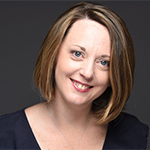Associate Publisher and Journals Director, American Society of Civil Engineers
 Please tell us a bit about yourself (e.g. hometown, current locale, course of study).
Please tell us a bit about yourself (e.g. hometown, current locale, course of study).
I am a New Englander at heart. I grew up in Connecticut and went to college outside of Boston. I never realized that “New Englander” was actually a profile type until I moved to Northern Virginia. I graduated from a typical New England liberal arts college with a degree in English and a minor in journalism. My first job out of college was as a local beat newspaper reporter. In that first year, I learned that reporting is a tough, thankless job that doesn’t pay enough to cover the rent. So I moved into publishing.
Describe some of your current responsibilities, and what type of organization you belong to.
I am the associate publisher and journals director at the American Society of Civil Engineers. I am responsible for the acquisition and editorial side of the journals program, which includes 35 technical titles. I have the pleasure to work with a dedicated team that includes over 700 volunteer editors and associate editors. In addition to journals, ASCE has a strong books program with technical reports, manuals of practice, standards, and conference proceedings.
What was your first scholarly publishing role? How did you get that job? What path led to your current position?
Once I figured that I wasn’t cut out to be Woodward or Bernstein, I realized that what I really liked was putting stuff together. I was lucky to get an entry level spot in the production department at Appleton & Lange, a publisher of medical textbooks and at that time, part of the Simon & Schuster empire. Pearson Education bought up the S&S technical imprints and I made my move to picturesque Upper Saddle River, NJ, (I’m not being sarcastic—Bergen County is lovely) to work at Globe Fearon, an imprint handling elementary to high school textbooks.
Journals weren’t on my radar, but I found myself in the Washington, DC, area where journals outrank books. I became the journal production manager here at ASCE, did a 4-year stint in Atlanta as a managing editor at the American Cancer Society, and back to ASCE in production and then a move to journals editorial.
If there was a pivotal moment or key person in your career development, please describe briefly.
There have been a lot of people in my development that were key, not the least of which, my mother who is my biggest cheerleader and gives the best career advice. Professionally speaking, I was excited to have an opportunity to come back to ASCE. Our publisher, Bruce Gossett, runs our society publication like a commercial operation while still maintaining the heart of a society service. I have certainly learned a lot from him and he has been supportive of my long list of extracurricular activities.
I really enjoy working with my fellow directors in ASCE publications. We solve lots of problems collaboratively. I also have a fantastic team of journals staff that provide excellent service to our authors and editors. They keep the trains on the track and make me look good every day.
What tools, web sites and organizations do you find most valuable for your career development?
Is Twitter a tool or a website? Either way, when I went on Twitter, I started following people that I had no other direct connection to—mostly researchers and lots of OA advocates. My “must read” list also now includes a lot of academic librarians. It’s important to me to hear their perspective, read what they are reading, understand their goals.
The Council of Science Editors was huge for my development. I became involved in the excellent short courses and worked on various committees before serving on the board, eventually as President. My networking opportunities are importnat at CSE meetings and it feels like home.
The Scholarly Kitchen is also a must read (disclaimer: I am the associate editor). The variety of perspectives is extremely helpful and being a contributor has certainly provided me with exposure I would not have had normally.
What are some of the surprises/obstacles that you’ve encountered during your career?
Having worked on engineering and medical journals, I was surprised at the extreme differences between the two. Having learned more about other disciplines, it’s clear that there will never be a one-size-fits-all solution to every challenge. That said, there are some things that remain incredibly consistent and standard across the board. Making a change from one discipline to another requires being open to how a new set of authors/editors/reviewers will behave.
What do you wish you knew more about?
I am learning more about the sales and marketing side of our publications. Having a better understanding of the global perspective on the buying side of the equation has been very helpful to me.
What advice would you give to people interested in a career in scholarly communications?
Are there people interested in a career in scholarly communications? I thought we all landed here by accident. I suppose my advice would be to network early and often. Seek out mentors. Be open to all kinds of positions within the industry. Brush up on technical skills—metadata and database management.
If you have a blog or personal/professional website, please provide a link.
You can find me in the Kitchen where I share my deepest thoughts on scholarly publishing,

